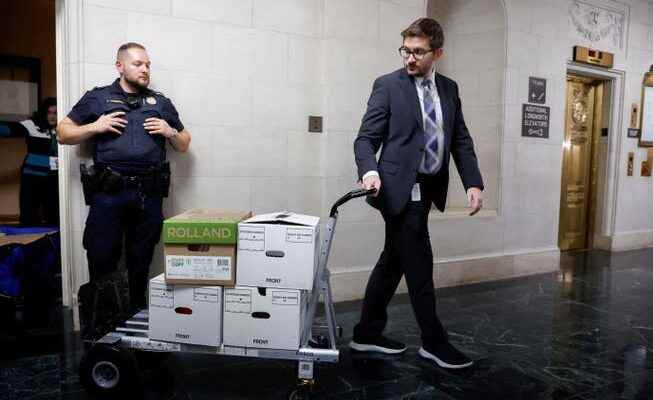Disclosing their tax returns is a norm, not a requirement, for American presidential candidates. It is therefore wrong that the Democrats published Trump’s documents. In any case, other than his tax practice disqualifies him for further political offices.
Congressional committee staffers move boxes full of documents related to Trump’s taxes.
“I welcome this investigation because people need to know whether or not their president is a crook. And I’m not a crook.” In 1973, President Richard Nixon responded to questions about his tax bills with these famous words. Shortly before, a local newspaper reported that that Nixon paid only $793 in federal taxes in 1970 and only marginally more in the following year. The President then had his tax returns for the years 1969 to 1972 published. “The confidentiality of my personal finances is far less important to me than Americans’ trust in the President’s integrity,” he said.
With this, Nixon set an example. In the decades that followed, every presidential candidate made their tax returns or related information public before the election—with one exception: Donald Trump. The New York real estate mogul broke a norm that we’d taken for granted, and one that makes perfect sense. It is legitimate to want to know how much a person has contributed to the budget of the state he intends to lead. In addition, the power of the presidency harbors a considerable risk of corruption. There can therefore not be too much transparency – not only, but especially when a candidate with such a diverse entrepreneurial activity as Trump is aiming for the White House.
A delicate precedent in the political mudslinging
Nevertheless, the publication of the tax return is just a norm, there is no legal entitlement to it. Congress could have anchored one, but has so far refrained from doing so. That’s why the Democrats used a trick to get Trump’s tax documents after all. The congressional committee responsible for such matters requested the files from the IRS, arguing that they wanted to identify possible loopholes in the law and monitor the tax audit of presidents. He is entitled to do so if he can assert a legislative purpose.
After years of legal wrangling, the conservative-leaning Supreme Court recently unanimously and correctly approved the release of the documents to the committee. In the American system of checks and balances, Congressional oversight has traditionally been interpreted broadly. In fact, the documents also show grievances that politicians should address. Despite a duty to do so, the IRS failed to review Trump’s tax returns in 2017 and 2018. The agency began analyzing it just as the congressional committee began investigating. This is questionable and a finding relevant to the public.
However, it is unnecessary and a violation of Trump’s rights that the democratic majority of the committee decided to publish the tax documents. Unlike their right to inspect, this serves no legislative purpose, but only a cheap political game. It also sets another problematic precedent in the mudslinging between the two political camps. If he catches on, the legally enshrined tax secrecy for controversial players will soon only exist on paper.
The judiciary is on the train
Trump’s years of refusal to disclose the files was undoubtedly offensive and gave the impression he had something to hide. That made him politically vulnerable. But that was up to voters to judge, and Trump was elected in 2016, even though tax filing was a constant issue at the time. Apparently, this information was not particularly important to the population.
Why they should be relevant now, two years after Trump’s deselection, is a mystery. The former president apparently paid hardly any taxes in a few years thanks to controversial deductions. If this happened illegally, it is a case for the judiciary, which recently convicted his company of tax fraud. If courts came to the same conclusion for him personally, this would of course be politically significant. But Trump has long since disqualified himself for any further office – not because of his tax practice, but because of instigating a violent attempt to overthrow.
